This page contains affiliate links. Please read our disclosure for more info.
We drove further into a remote desert landscape, leaving behind villages for craggy mountains in shades of chocolate—dark, milk and creamy white. Eventually the tarmac came to a sudden stop and we switched to a beat up 4WD. We bumped along, deeper into Wadi Feynan, the rutted gravel track winding next to the dry river bed, imposing rocky mountains looming over us.
30 minutes later we reached Feynan Ecolodge, the sandstone building decorated with rocks blending into the craggy mountains. The lodge is on the western edge of the Dana Biosphere Reserve, the largest nature reserve in Jordan, which descends from 1500m up in the mountains to below sea level at Wadi Araba, encompassing four different bio-geographical zones with diverse landscapes, wildlife and geology.
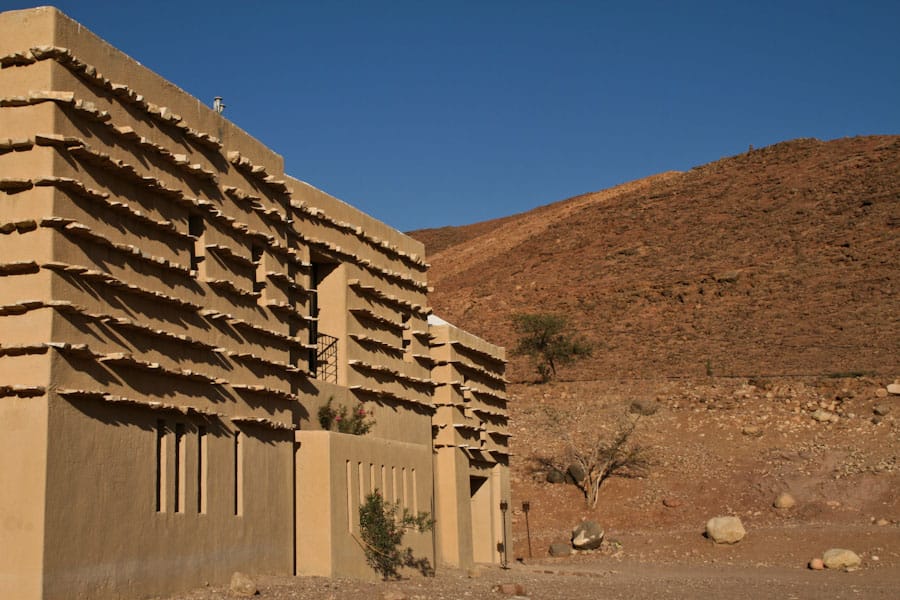
A True Eco Hotel
The word eco is often used by hotels who have no real claim to it but Feynan felt different, and is making a real difference to the community. All 26 staff are local Bedouin, mostly young guys who welcomed us warmly and gave us lots of information about the place and the activities on offer. In such a remote area job opportunities were non existent before the lodge opened so now young men can stay with their families rather than moving to the city.
Employment opportunities are also provided to drivers, who get 100% of the transfer fees from guests, a local woman who makes bread for the lodge, and they run leather and candle making workshops for local women who sell their handmade items in the lodge’s shop. Feynan strives to find the balance between helping nature and people. Before ibex were hunted for meat but now locals work as rangers to control the hunters and preserve the population of this wild mountain goat.
The lodge has impressive eco credentials too. It’s run entirely on solar power which is used to heat water, for bathroom lights, the kitchen and the reception (where you can charge devices). At night candle light is the primary light source, but this only adds to the secluded, get away from it all atmosphere.
The lodge is on a mission to reduce plastic so provides filtered water for guests to drink including a handmade clay pot of water left in your room. You can also buy reusable bottles to fill up in their shop. Almost all their waste is recycled and they’ve implemented a recycling scheme in the local community.
Feynan manages to be eco friendly without sacrificing comfort. It’s simple but beautifully designed with lots of details like a door of hand knockers and unique furnishings and artwork.
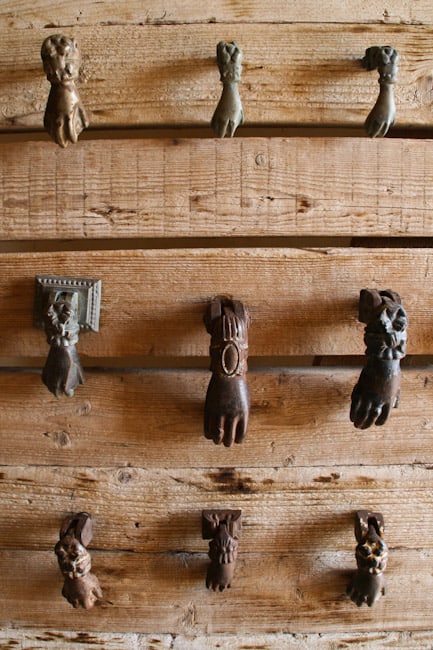
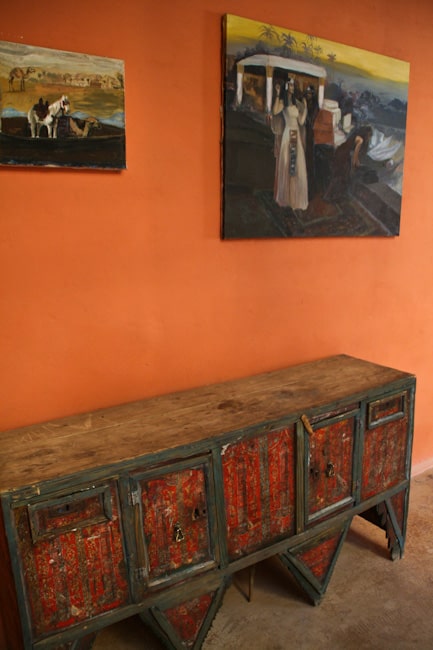
There are lots of places to relax—hammocks, a lounge with books and games, rooftop mattresses, and a number of outside seating areas, but as tempting as they were after our bumpy drive, we decided to go along for the free sunset hike that’s offered to guests each evening.
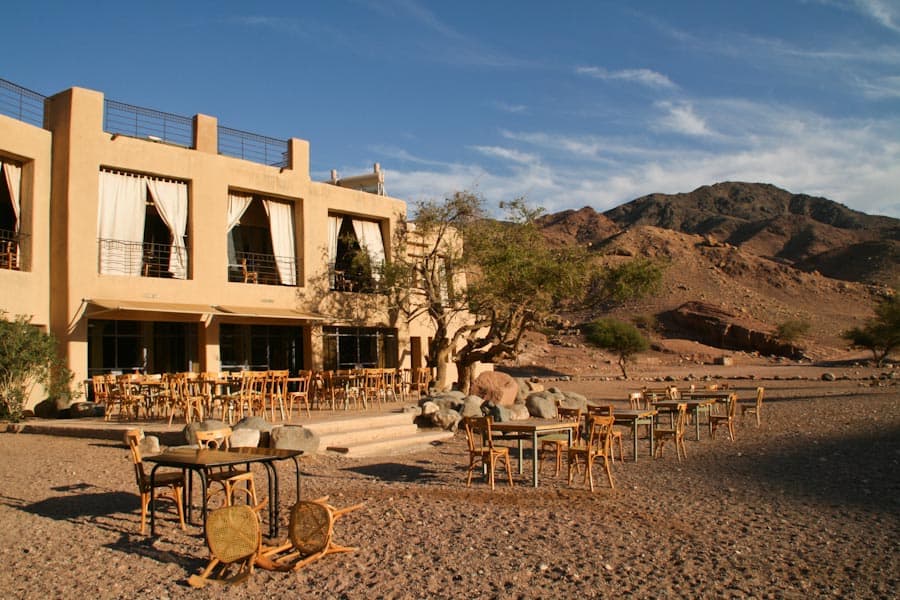
Bedouin Bread
Our guide Suleman was in his early 20s and had a quick wit and easy laugh. On our walk he entertained us with Bedouin stories that we weren’t quite sure were true or local legends—like the one about the 85 year old local man who was washed away in a flash flood and while his family mourned was swept back up by the river, alive and clinging to a tree.
What makes Feynan special is the insight into the lives of the Bedouin, the desert-dwelling semi-nomads—40-50 families live spread out in tented camps throughout the valley. There’s a small church and mosque but those are the only permanent structures other than the ecolodge.
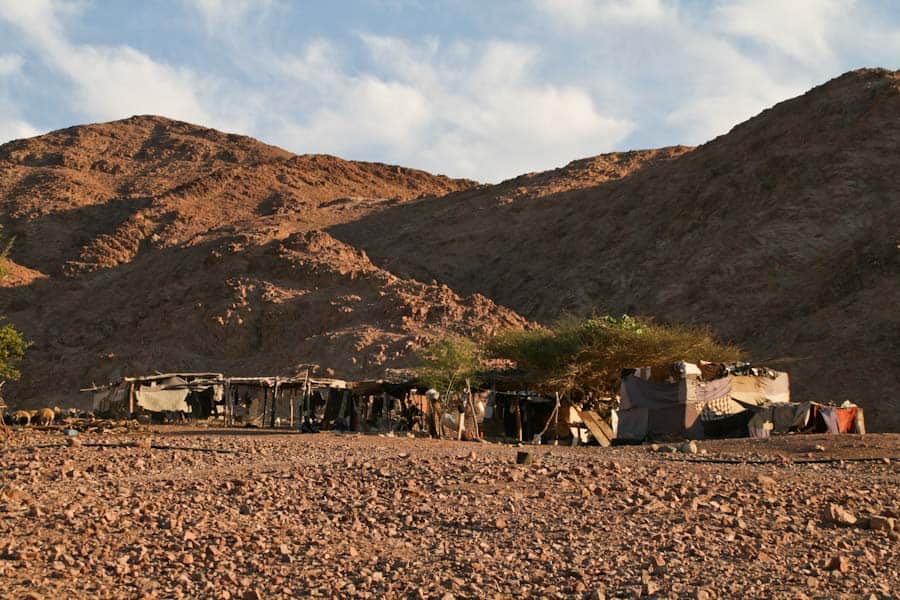
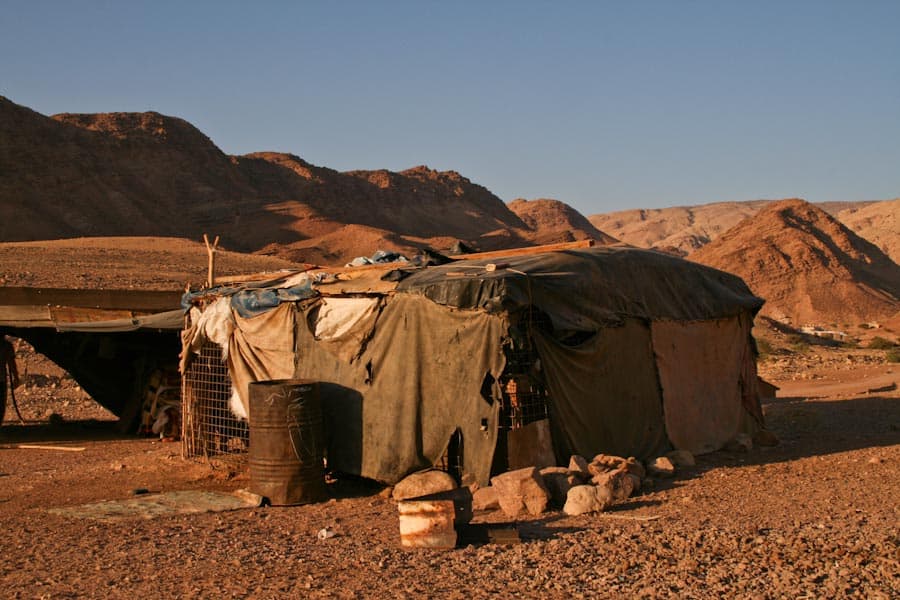
We made our way through herds of goats and packs of kids to one of the Bedouin tents to see bread being made—the bread we’d be eating for dinner in fact. Inside the tent the smoke stung our eyes but didn’t seem to bother the burqa-clad woman who crouched over the fire, avoiding our eyes, as she flung balls of dough into large thin disks with impressive handiwork reminiscent of Italian pizzaioli. The shrak bread cooks in minutes on an iron dome like an upturned wok over the open fire and the kids happily helped themselves to the finished product and gave us some to sample too—still hot from the fire, it was sublime.
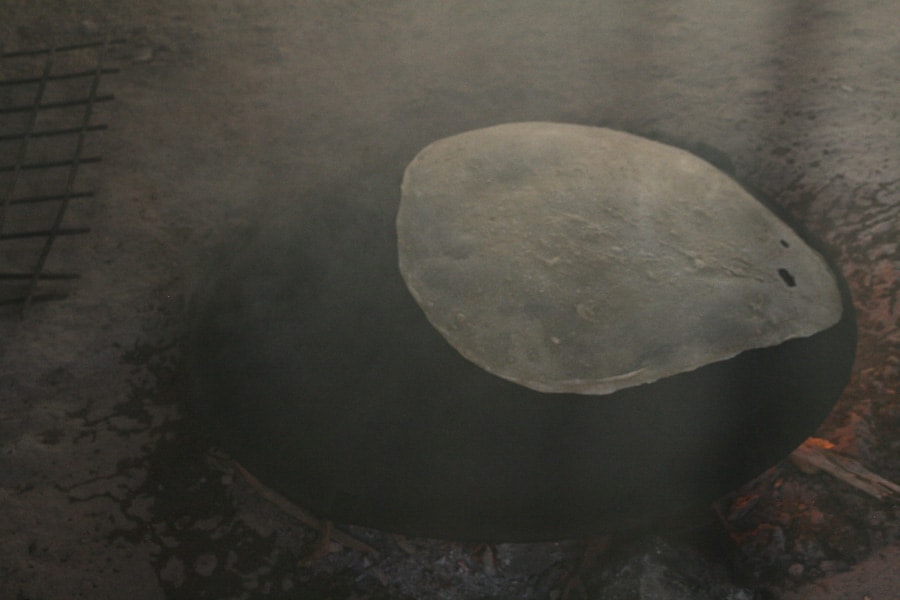
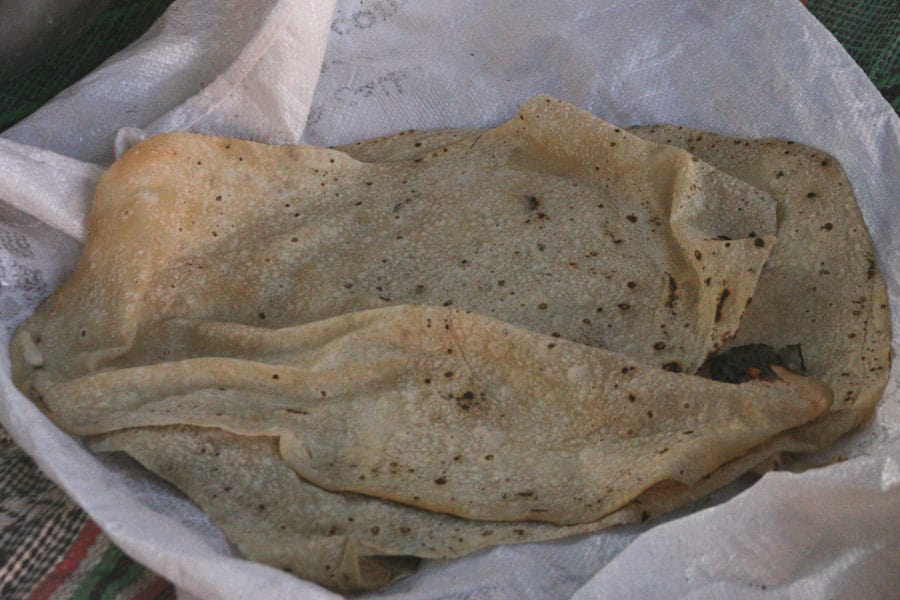
Sunset
We left the camps behind and walked further into the granite mountains, glowing red in the golden hour. It’s a harsh, lifeless landscape but achingly beautiful.
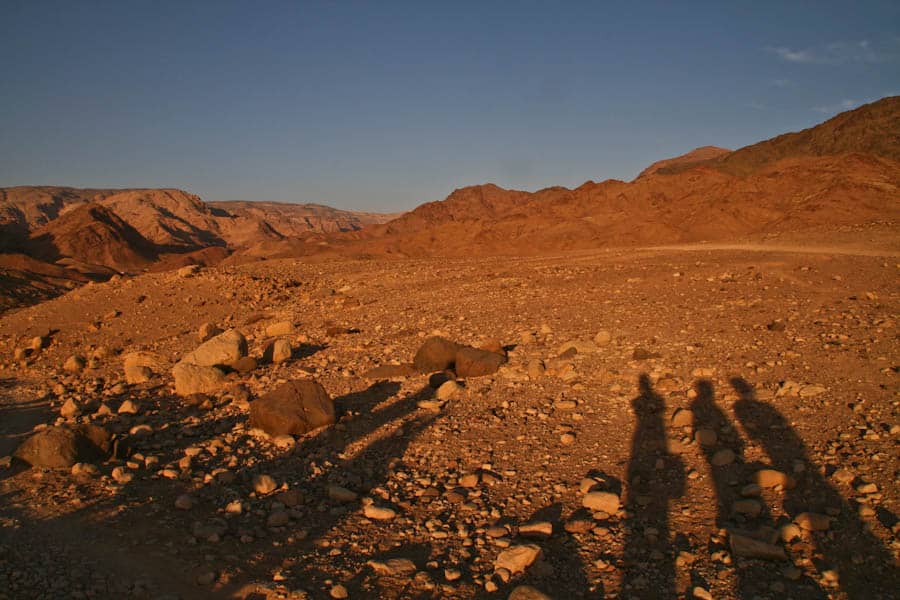
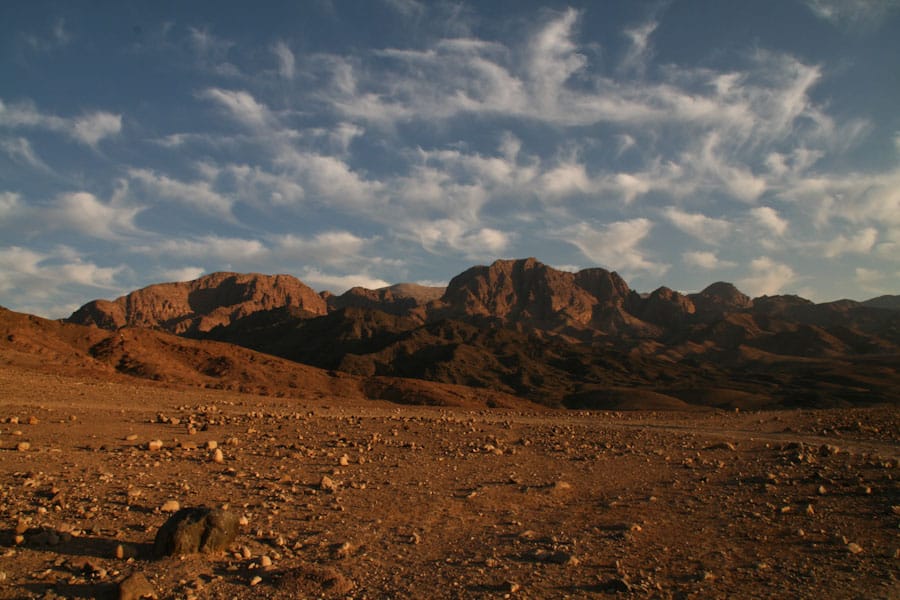
We were impressed by Suleman’s knowledge—the Feynan staff have obviously been very well trained and are passionate about their jobs. He explained the historic significance of the valley which has the oldest copper mines in the world at 8000 years old, and a 12,000 year old neolithic village was discovered on top of the mountain in 2002.
He directed us to the best sunset spot and left us alone in the emptiness. It felt utterly still and silent but as we became accustomed to the unusual peace we began to pick out different sounds—the beat of a bird’s wings flying close by, the buzzing flies, birds chirping, and the honking cacophony of a donkey braying in the distance.
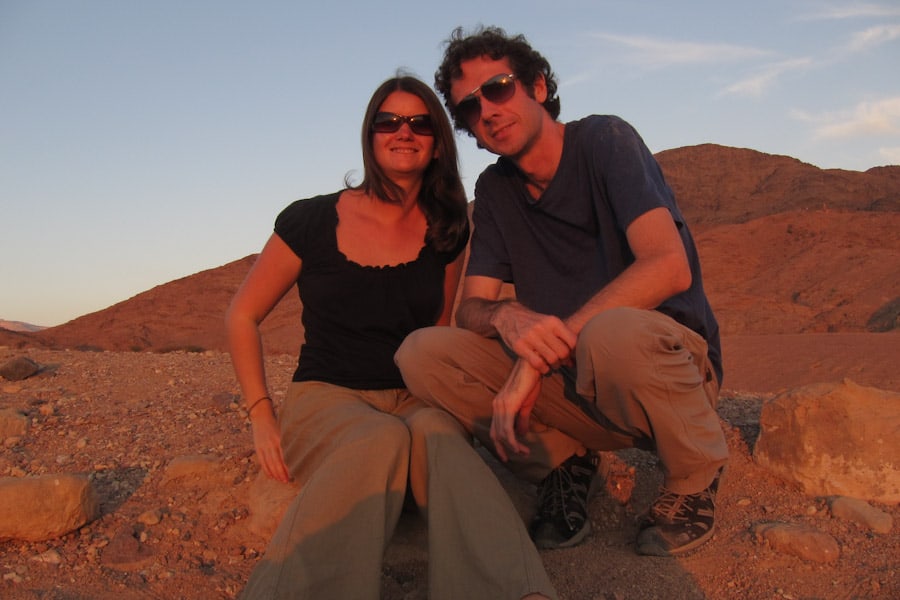
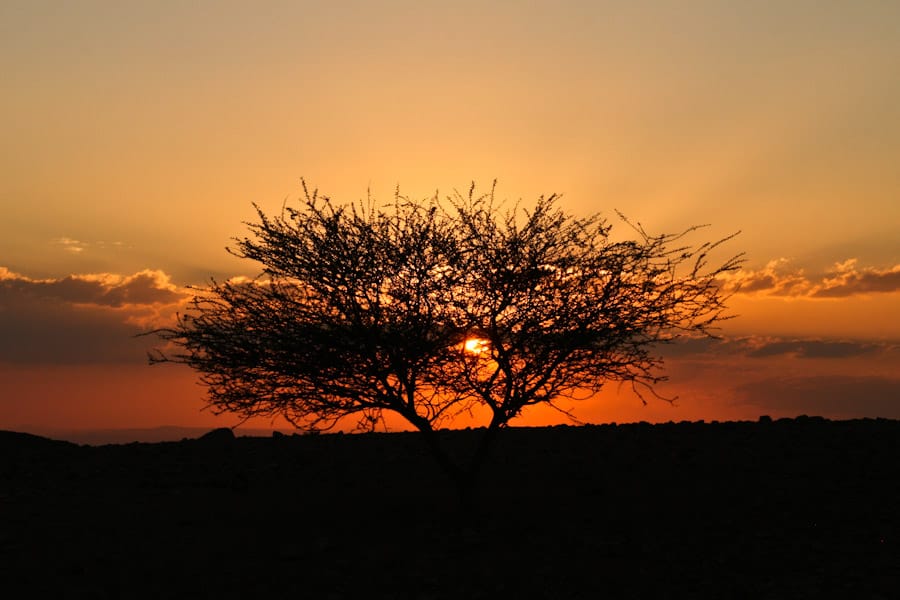
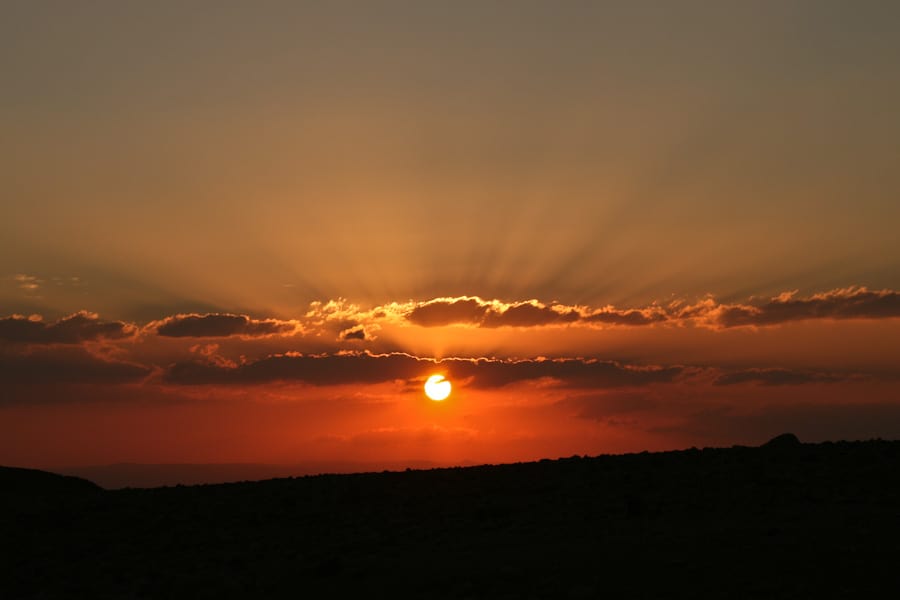
We watched the sun set behind one of the few trees, lighting up the sky in red and orange, before joining the others at the campfire. The guides had brewed some delicious Bedouin tea—served in tiny glasses it was black, very sweet and flavoured with sage. The locals added even more sugar to theirs—an explanation of the condition of their teeth.
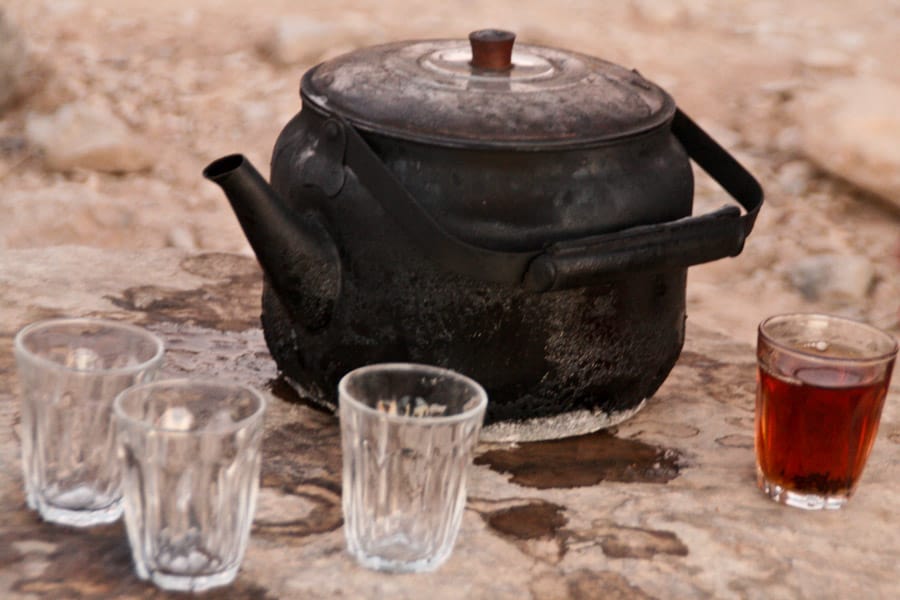
As the last light faded we sat on rocks sipping the hot tea while the call to prayer echoed through the valley—the haunting, impassioned song of devotion that’s heard five times a day; our guides walked off and found a quiet spot to pray.
Bedouin Life
On the way back to the lodge in the dark Suleman took us to visit his family’s camp. Some Bedouin families move six times a year to find water and the best grazing for their goats, but Suleman’s family moves just twice a year. In the winter they move 500 metres to a more sheltered position from the cold weather.
The extended family live in different goat hair tents within the same compound—Suleman has 11 brothers and sisters. Privacy is limited but rules apply to preserve it as much as possible—you must enter a Bedouin camp from the front and a cough acts in place of a doorbell to announce your arrival. Guests are welcome any time of day or night for food, drinks or a place to sleep. The Bedouins’ extraordinary hospitality means than only after three days does the host subtly ask the guest how they can help.
Suleman had married the year before and 1500 people attended the three night long party. I wondered how on earth he could afford it and he explained it had taken 20 goats to feed them all, but laughed and said that was OK as he received 24 goats as wedding presents so ended up on top. The community supports each other here, helping out in times of trouble and of joy. Suleman will return the favour by bringing a goat to someone else’s wedding.
We were welcomed warmly by Suleman’s father and sat on colourful rugs inside one of the black goat hair tents used to receive male guests—the women have their own area but as a foreigner the rules didn’t seem to apply to me. Each tent takes 100 goats and three to four months of weaving to make. A fire is lit inside the tent in the winter months to keep it cosy and warm, but no doubt smoky judging by the bread tent we’d visited earlier. In summer a cooler bamboo tent is used, or they just sleep under the stars.
Goats are an important part of the Bedouin economy. The family has 100 and they are used for weaving their hair, milking, eating and sold for cash when needed.
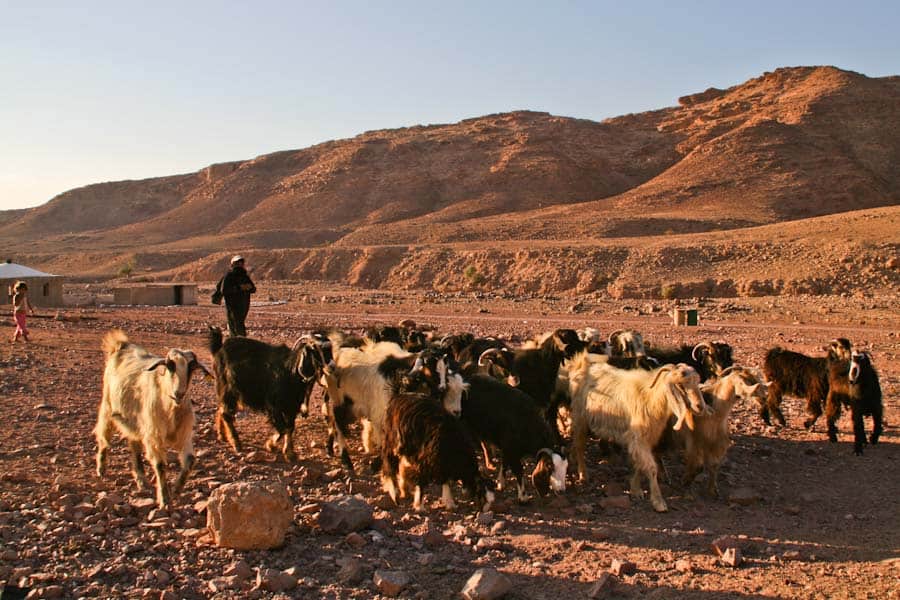
We didn’t have time before dinner for a long visit so we skipped the three cups of the traditional coffee ceremony to welcome guests, but Suleman showed us the mihbash, a large, very heavy coffee grinder made from solid pistachio wood with carved and silver decoration. The coffee beans are bashed with a two foot long pestle that serves a double purpose as percussion instrument while grinding. This one had been in the family for fifty years.
As we sat cross legged in the darkness Suleman’s father’s mobile phone went off, a loud intrusion of the modern world that reminded us that although some things haven’t changed in Bedouin culture for centuries, many things have. It seemed remarkable that there was even reception in this remote valley but we found Jordan to be very well connected. When the Bedouin move camps the strength of the phone signal can be a deciding factor in where to move.
A Candlelit Night
When we returned the lodge’s corridors were lined with candles glowing in paper bags, and the staff had lit candles in our room giving it a romantic, magical feel. At 7.30pm the dinner bell went off and we helped ourselves to the vegetarian feast—the biggest selection of meat-free mezze and hot dishes we’d had on our trip. All fresh, tasty and made with vegetables from local farmers where possible. We ate outside by candle light, under the stars.
After the meal we were invited to drink more sweet tea and stargaze on the roof. The staff showed us huge clusters of stars, Neptune, and the Andromeda Galaxy, two million light years away, on their big telescope. Even without a telescope the lack of light pollution means the stars are the clearest we’ve seen in a long time. We lay on mattresses gazing up at the Milky Way and watching shooting stars.
Dragging Us Away
Breakfast was another delicious vegetarian spread eaten under the mountains, glowing red as the early morning sun hit them. Goats trotted past on their way to graze in the mountains (one chewing a napkin it had stolen from a table), and Hamid, a local entrepreneurial youth, brought his camel by, shyly offering rides.
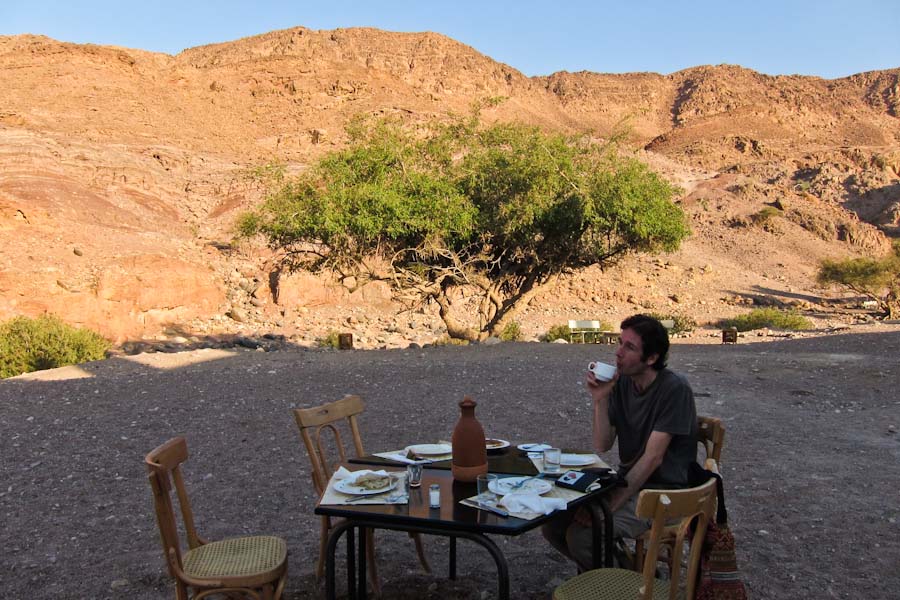
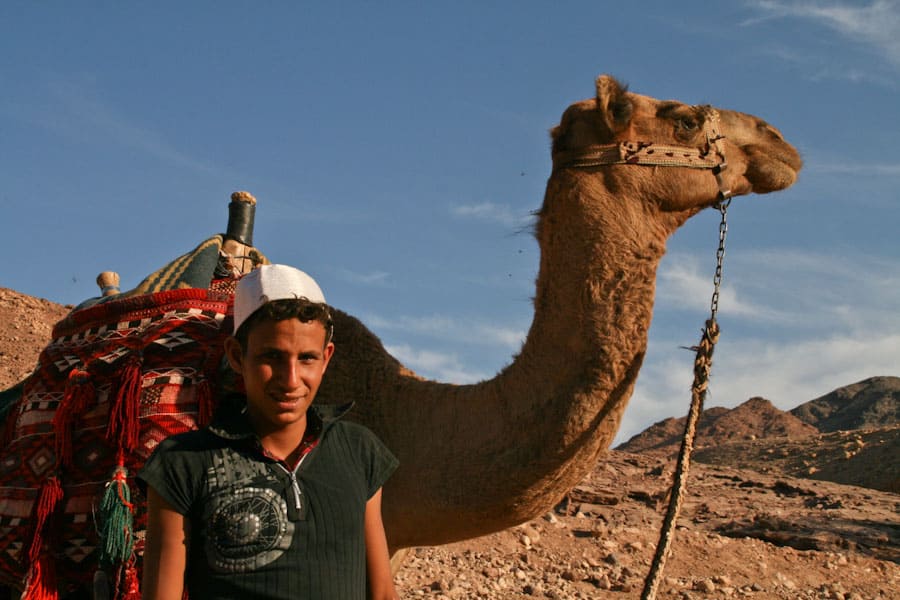
Feynan was the hardest place to leave on our Jordan trip. We wanted to stay and visit more Bedouin families, hike in the mountains, laze in a hammock, and most intriguingly—spend a day with the goats, walking with them up into the mountains, making tea and bread on a campfire, and getting a unique insight into the life of a Bedouin goat herder. Next time…
Feynan Ecolodge Details
Feynan Ecolodge was the most special and unique place we stayed in Jordan. The staff went above and beyond to help us and inform us about Bedouin life and the many activities on offer at the lodge.
There are 26 rooms, all with modern ensuites, starting from 91.80 JOD ($130) in high season. We stayed in a comfortable deluxe room with a balcony and views of the mountains for 118.80 JOD ($168).
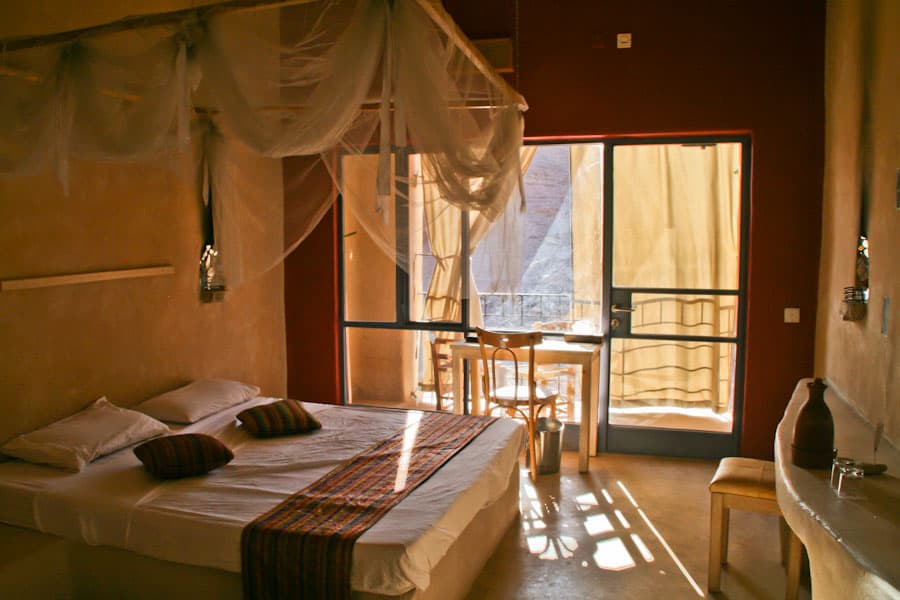
The only downside of the eco-friendliness is the lack of fans or A/C, which makes it quite hot at night. It’s a small price to pay though and you could always do what a couple of guests did and spend the night on the roof under the stars.
Feynan is in a remote location which can only be reached by a six hour hike from Dana village in the reserve, or via the Dead Sea Highway. The lodge can arrange transfers for you from various cities or if you have your own transport like us you can leave it at reception and get a ride in a 4WD along the unpaved section. From Petra there’s a spectacular but rough mountain route. Public transport is an option—see the Feynan website for details.
Feynan Ecolodge was chosen as one of top 50 ecolodges in the world by National Geographic Adventure Magazine and we can see why. They seem truly committed to creating a sustainable lodge that causes the least amount of harm to the environment and the most benefit to the local community. We wish there were more places like this in the world.
Petra may be the biggest “must-see” in Jordan but for us, Feynan comes a close second.
More About The Bedouin
- We loved Audrey and Dan from Uncornered Market’s life lessons learned from Jordan’s Bedouin.
- Married to a Bedouin is an interesting read about a young woman from New Zealand who falls in love with a Bedouin man and lives with him in a cave at Petra, becoming part of the Bedouin community.
A big thank you to Visit Jordan who hosted us during our stay in Jordan.
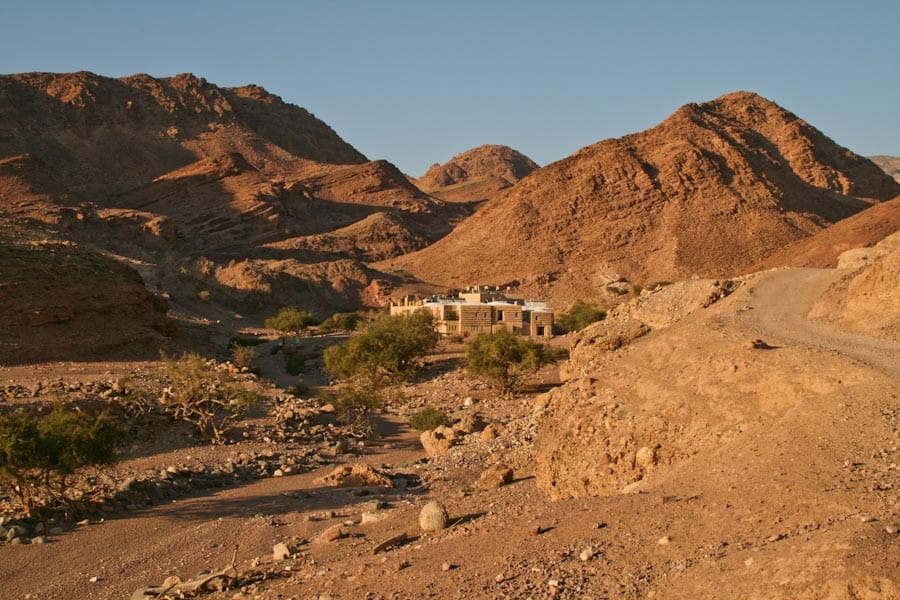
what about spending honeymoon there ? … I’m substantially thinking about that .. what do you think?
I think it would be very romantic as long as you aren’t expecting much luxury. Have a wonderful honeymoon!
OMG, I have to do it! I have to change my itinerary in Jordan/Israel to accommodate going to Feynan Ecolodge! I will be traveling to both countries in May. Any other advice would be greatly appreciated.
Yes, do! It was only second to Petra for us in Jordan. We’d also recommend spending a night at the Dead Sea, and at least two days at Petra if you like hiking. Here are more of our tips: http://www.neverendingvoyage.com/planning-a-trip-to-jordan/
Have a fantastic trip!
my wife and i spend the first two nights of our honeymoon there… we loved it!
We spent the night on the roof in Feynan– the staff even took little beds up there for us– and it was an incredible experience to sleep under the stars. We’d come via the grueling 8-hour hike from Dana (which included our guide being stung by a scorpion and Mary & I being chased by a camel), so you definitely made the smart choice in driving in to the lodge!
What a wonderful experience! We actually really wanted to do that hike but I was ill and didn’t have the strength for it – sounds like quite a hike!
That hotel looks fabulous, and what a special night!
It’s a wonderful place and our favourite night in Jordan.
Wow! What an incredible experience to have. That bread sounds delicious. Thanks for sharing it with us :-)
It’s an amazing place and yes, the bread is wonderful!
I love your style of writing, I want to go with my family right now. We have plans but they are in the early stages! By the way, have you airbrushed yourselves-you look far too glamourous and sophisticated in these photos LOL! We can’t even go to town and we look like we have been dragged through a hedge backwards!
Thanks so much for your kind words Melanie. I’m not sure we ever look glamorous :) The late afternoon light must have been flattering! I hope you make it to Jordan and feel free to ask any questions.
Can you tell me what kinds of activities were offered at Feynan EcoLodge? Did they offer different hikes or trips to Petra and other Wadis??
I’m not sure there were trips to Petra but they offered various hikes and village visits. See their website for more details: https://www.ecohotels.me/en/feynan/activities